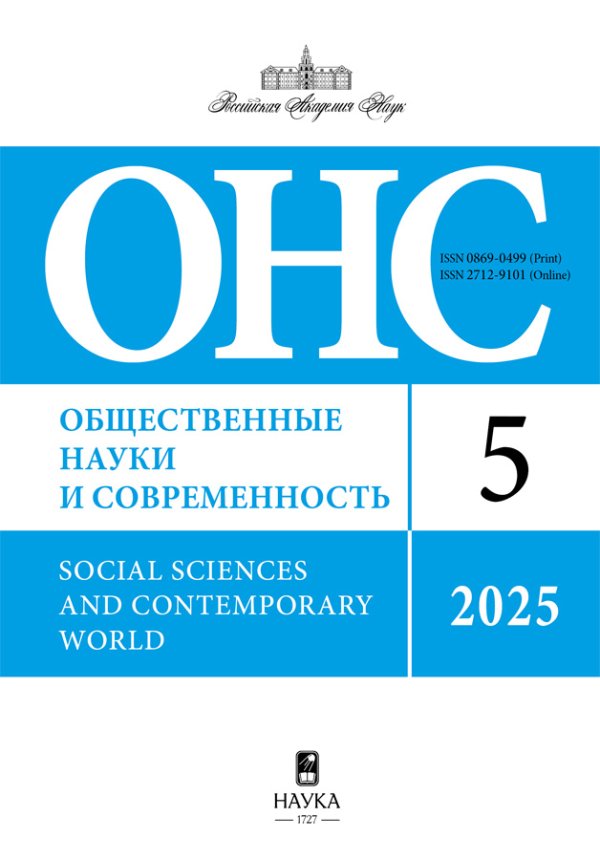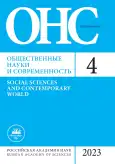The left-wing ideology of the new elites: from luxury beliefs to universal humanism
- Authors: Davydov D.A.1
-
Affiliations:
- Institute of Philosophy and Law, Ural Branch of the RAS
- Issue: No 4 (2023)
- Pages: 7-21
- Section: Articles
- URL: https://journal-vniispk.ru/0869-0499/article/view/249423
- DOI: https://doi.org/10.31857/S0869049923040019
- EDN: https://elibrary.ru/OYPQIM
- ID: 249423
Cite item
Full Text
Abstract
About the authors
Dmitriy A. Davydov
Institute of Philosophy and Law, Ural Branch of the RAS
Email: davydovdmitriy90@gmail.com
Ekaterinburg, Russia
References
- Белл Д. (2004) Грядущее постиндустриальное общество. Опыт социального прогнозирования. М.: Academia. 944 с.
- Брукс Д. (2013) Бобо в раю: Откуда берется новая элита. М.: Ад Маргинем. 296 с.
- Вайнен Р. (2020) Долгий '68. Радикальный протест и его враги. М.: Альпина нон-фикшн. 627 с.
- Веблен Т. (1984) Теория праздного класса. М.: Прогресс. 368 с.
- Давыдов Д.А. (2022) Классовое господство в эпоху посткапитализма. Часть 1. Этос персоналиата // Социологические исследования. № 7. С. 142-152.
- Давыдов Д.А. (2021) Посткапитализм и рождение персоналиата. М.: Рипол Классик. 336 с.
- Кагарлицкий Б.Ю. (2017) Между классом и дискурсом. Левые интеллектуалы на страже капитализма. М.: ВШЭ. 280 с.
- Кондрашов П.Н. (2016) Какого же Маркса мы читаем? Часть 2 // Дискурс-Пи. № 3-4. С. 238-246.
- Перри Л. (2022) Темная сторона сексуальной революции. Переосмысление эпохи эротической свободы. М.: Издательство АСТ. 320 с.
- Флорида Р. (2016) Креативный класс: Люди, которые создают будущее. М.: Манн, Иванов и Фербер. 384 с.
- Bohrer A.J. (2019) Marxism and Intersectionality: Race, Gender, Class and Sexuality under Contemporary Capitalism. Bielefeld: Transcript-Verlag. 280 p.
- Borjas G.J. (2016) We Wanted Workers: Unraveling the Immigration Narrative. New York: W.W. Norton & Company. 240 p.
- Cafaro P. (2015) How Many Is Too Many? The Progressive Argument for Reducing Immigration into the United States. Chicago: University of Chicago Press. 336 p.
- Chibber V. (2022) Confronting Capitalism. How the World Works and How to Change It. New York: Verso. 176 p.
- Currid-Halkett E. (2017) The Sum of Small Things: A Theory of the Aspirational Class. Princeton: Princeton University Press. 272 p.
- Embery P. (2020) Despised: Why the Modern Left Loathes the Working Class. Cambridge: Polity. 216 p.
- Enke B., Polborn M., Wu A. (2022) Morals as Luxury Goods and Political Polarization. Working Paper. (https://www.hbs.edu/faculty/Pages/item.aspx?num=62425)
- Foster J.B. (2015) Marxism and Ecology. Common Fonts of a Great Transition // Monthly Review. Vol. 67. No. 7. Pp. 1-13.
- Geismer L. (2014) Don't Blame Us: Suburban Liberals and the Transformation of the Democratic Party. Princeton: Princeton University Press. 392 p.
- Gilbert J. (2020) Twenty-First Century Socialism. Cambridge: Polity. 140 p.
- Inglehart R. (1977) The Silent Revolution. Princeton: Princeton University Press. 496 p.
- Inglehart R. (1997) Modernization and Postmodernization. Princeton: Princeton University Press. 464 p.
- Johnson D.J. et al. (2019) Officer Characteristics and Racial Disparities in Fatal Officer-Involved Shootings // PNAS. Vol. 116. No. 32. Pp. 15877-15882.
- Kaba M., Ritchie A. (2022) No More Police: A Case for Abolition. New York: The New Press. 400 p.
- Lewis S.A. (2019) Full Surrogacy Now: Feminism Against Family. New York: Verso. 224 p.
- Lewis S. A. (2022) Abolish the Family: A Manifesto for Care and Liberation. New York: Verso. 128 p.
- Lomborg B. (2020) False Alarm: How Climate Change Panic Costs Us Trillions, Hurts the Poor, and Fails to Fix the Planet. New York: Basic Books. 320 p.
- Markovits D. (2019) The Meritocracy Trap: How America's Foundational Myth Feeds Inequality, Dismantles the Middle Class, and Devours the Elite. New York: Penguin Press. 448 p.
- Mouffe C. (2022) Towards a Green Democratic Revolution: Left Populism and the Power of Affects. New York: Verso. 96 p.
- Norris P., Inglehart R. (2019) Cultural Backlash. Trump, Brexit, and Authoritarian Populism. Cambridge: Cambridge University Press. 564 p.
- Nussbaum M.C. (2023) Justice for Animals: Our Collective Responsibility. New York: Simon-Schuster. 400 p.
- Pluckrose H., Lindsay J. (2020) Cynical Theories: How Activist Scholarship Made Everything about Race, Gender, and Identity - and Why This Harms Everybody. Durham, DC: Pitchstone. 352 p.
- Purnell D. (2021) Becoming Abolitionists: Police, Protests, and the Pursuit of Freedom. New York: Astra House. 288 p.
- Sandel M. (2020) The Tyranny of Merit: What's Become of the Common Good? New York: Farrar, Straus and Giroux. 288 p.
- Shellenberger M. (2020) Apocalypse Never: Why Environmental Alarmism Hurts Us All. New York: Harper. 432 p.
- Srnicek N., Williams A. (2016) Inventing the Future: Postcapitalism and a World Without Work. New York: Verso. 272 p.
- Uhlmann N. E. (2019) Abolish ICE. New York: OR Books. 128 p.
- Wright E.O. (2021) How to Be an Anticapitalist in the Twenty-First Century. New York: Verso. 176 p.
- Yglesias M. (2020) One Billion Americans: The Case for Thinking Bigger. New York: Portfolio. 288 p.
Supplementary files










